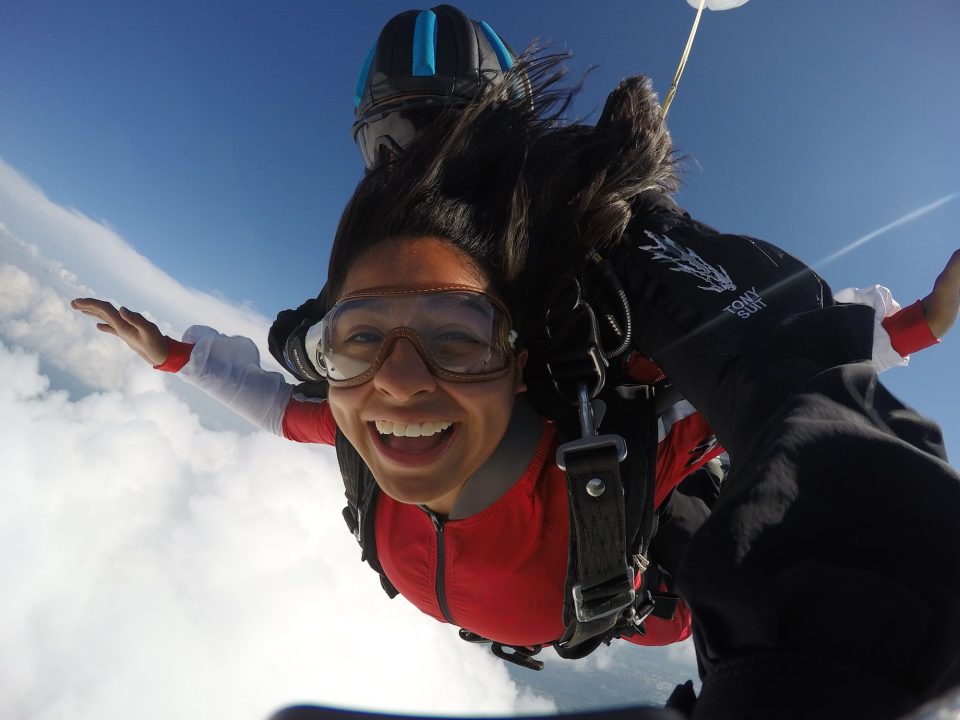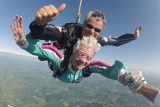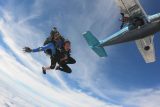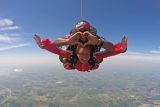How To Breathe While Skydiving
Skydiving Tips
Posted by: Wisconsin Skydiving Center 5 years ago
Are you worried about breathing during your skydive? Perhaps the real question is are you worried about every aspect of your skydive? If that sounds like you, take a deep breath – we’ve got you! In this article, we’re going to break it down with some straight talk – some real honesty that covers the questions that concern you most without sugar-coating it. Let’s dig in by answering the question that brought you here:
How To Breathe While Skydiving
It’s often believed that you can’t breathe during a skydive, but this isn’t true. You can breathe while skydiving. The key is to relax, breathe through your nose, and out through your mouth. It’s that simple!
Exiting an airplane literally takes your breath away to the point that many people hold their breath, but you can indeed breathe and there will be plenty of oxygen in the air. Have no fear, we’ll talk you through the entire experience!
Below are the top questions we hear nearly every day!

Is Skydiving Scary?
First things first. Is skydiving scary? Truthfully, it is. If it wasn’t, it wouldn’t be nearly as fulfilling. Great achievement in life usually comes from facing something that scares us and then working through it until we come out the other side victorious. This is where empowerment comes from. We teach you to embrace the fear, wrestle with it and then breathe through it. This process is a great analogy for getting most things in life!
The scary part about skydiving is really the fear of the unknown and not the physical act of skydiving itself. The mental challenges of preparing to leave the plane is where fear resides, but stepping through the door and leaping into free fall is blissful! Many would say it’s therapeutic!
In skydiving, as in life, we must measure risk and reward and as many of our guests would testify, the rewards of skydiving are great!
Will You Pass Out During Your Skydive?
It is possible to pass out during your skydive – we have seen this happen when under parachute, but it’s not because of fear or lack of oxygen, but rather due to being dehydrated or having not eaten prior to making the skydive. There is a lot of nervous energy leading to the jump and when you finally exit the plane the body releases lots of energy and adrenaline. If there is nothing in the body to support that surge, then it’s feasible to pass out when under parachute. We’ve not seen this occur during free fall as the surge of adrenaline has everyone feeling very alert!
What Does Skydiving Feel Like?
Skydiving doesn’t feel like anything you’ve ever experienced before. It’s not weightless, but it’s darn near close! Many people think it feels like a rollercoaster but it feels nothing like that either! You don’t have your stomach in your throat when you exit the plane nor do you feel speed or ground rush – it’s like floating! To know what skydiving feels like is to experience it as it feels like nothing else!
Can You Go Skydiving If You’re Afraid of Heights?
Yes, yes and yes! Would you believe that many skydiving instructors and guests are afraid of heights (the official term is acrophobia). There’s a difference between being on the roof of a house and on the step of an airplane. Aside from the obvious difference in altitude, looking out on the horizon and seeing the beauty of the earth below is much different than seeing where you’ll fall and hit your head should you slip off the roof. It’s hard to explain but we routinely have guests that would rather not walk across a footbridge and still love skydiving!
What If the Parachute Doesn’t Open?
This is a common question and there is a possibility that the parachute may have some kind of malfunction. Many skydiving centers wouldn’t want you to know this, but it can and does happen from time to time. Having a parachute malfunction is a rare occurrence, but should it occur, hope isn’t lost thanks to the backup parachute, known as the reserve. All skydiving parachute systems are equipped with a main and a reserve parachute.
Should there be a need to jettison the main parachute, doing so is as simple as pulling on a handle that releases the main and then pulling on a different handle to deploy the reserve.
Let’s take it a step further… what if the tandem instructor were to pass out and is unable to deploy the reserve? Good news… there’s a sweet piece of technology built to handle that situation as well – it’s called an Automatic Activation Device (or AAD). The AAD is a small computer system that measures altitude and speed. The system intelligently recognizes that if a tandem instructor and student are still falling beyond a predetermined altitude threshold, then the computer will automatically deploy the reserve. It’s an incredible piece of technology and a device we have installed on all of our tandem parachute systems.
What If I Get To The Door and Decide Not to Jump?
The decision to exit the aircraft is yours and yours alone. If you don’t wish to skydive when it’s time to go, we won’t force you out. The empowerment that comes from skydiving derives from your decision to make it happen. If it’s a no-go for you, we’ll ride the plane down with you and we won’t make you feel bad about it as we don’t take the decision to jump for granted.
We should note that deciding to ride the plane down, even for those who are terrified, rarely happens. Our entire approach in our training is designed to prepare our guests for the moment when the plane door opens by using visualization and teaching you to get comfortable with the concept, focusing on your breathing, and remaining calm.
Is Skydiving Dangerous?
Skydiving isn’t without risk and is more dangerous than many other activities (it’s more dangerous than golf and tennis to be sure), but many would say that the risk of making a skydive is acceptable. According to the United States Parachute Association, the risk of death by making a tandem skydive is 1 in 500,000. According to this statistic, one is more likely to die from being struck by lightning or by being stung by a bee.
We hope we’ve addressed most of your fear or anxiety related to making your first skydive! Should you have any questions at all, please feel free to contact us or check out our FAQs page or view our related articles below.
Related Articles
- Is Skydiving Safe? State, Equipment and Your First Time
- Ready, Set, Skydive! How To Prepare For Your First Jump
- Top 5 Mental, Psychological and Physical Benefits of Skydiving
- First Time Skydiving Tips: How To Go Skydiving
- Skydiving Freefall – What’s it Like?
- Scared of Skydiving? Be Inspired by Owen Provenzano
Categories:
You May Be Interested In:

Can You Skydive With Dentures?
2 months ago by Wisconsin Skydiving Center

Why Is Skydiving So Expensive?
4 months ago by Wisconsin Skydiving Center

Can You Skydive In The Winter?
6 months ago by Wisconsin Skydiving Center

23 of the Best Skydiving Quotes and Captions for Social Media
1 year ago by Wisconsin Skydiving Center